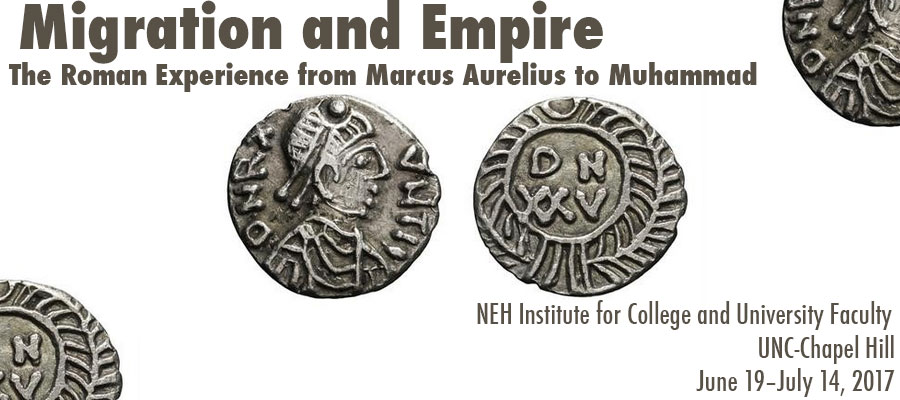Migration and Empire: The Roman Experience from Marcus Aurelius to Muhammad, NEH Institute for College and University Faculty, UNC-Chapel Hill, June 19–July 14, 2017
Romans lived on a spectrum of human movement across the imperial landscape. In the half-millennium between Marcus Aurelius (ruled 161-180 CE) and Muhammad (died 632), the immense, previously stable Roman Empire experienced—and provoked—migration and invasion in all directions on a traumatic, unprecedented scale both internally and externally. The consequences for the Roman Empire were enormous, including not least the loss of its provinces in Western Europe. The peoples in movement, and the territories beyond the shrinking imperial borders, also experienced dramatic change. All this historical change still makes its impact felt today. It is also most engaging from many perspectives for teachers and their students at the college level.
In the 21st century, gaining an informed grasp of these complex developments in the Roman world has become more challenging and more exciting for several reasons: First, old interpretations of the period as a “Migration Age” have been vigorously challenged. Second, new concerns such as climate change have gained a wholly new prominence in approaches to the migration; entirely fresh evidence, such as DNA, has been introduced into the discussion too. Third, our understanding of the phenomenon of migration in all periods of world history has grown significantly, especially through the findings of archaeologists working with prehistoric materials. Finally, the current migration crisis throughout Europe, North Africa, the Middle East, and the U.S. Southwest has made migration an urgent preoccupation featured daily in the media everywhere.
These developments drive us to confront the neglected fact that migration has been a driving force throughout human history. With the imperial Roman experience of migration and empire from Marcus Aurelius to Muhammad as our baseline, and with comparative case studies from other periods and cultures elsewhere on the globe, our Institute offers exceptional opportunities for questions and discussion.
Directors
Michael Maas (Rice University, Houston, TX)
Richard Talbert (University of North Carolina, Chapel Hill, NC)
